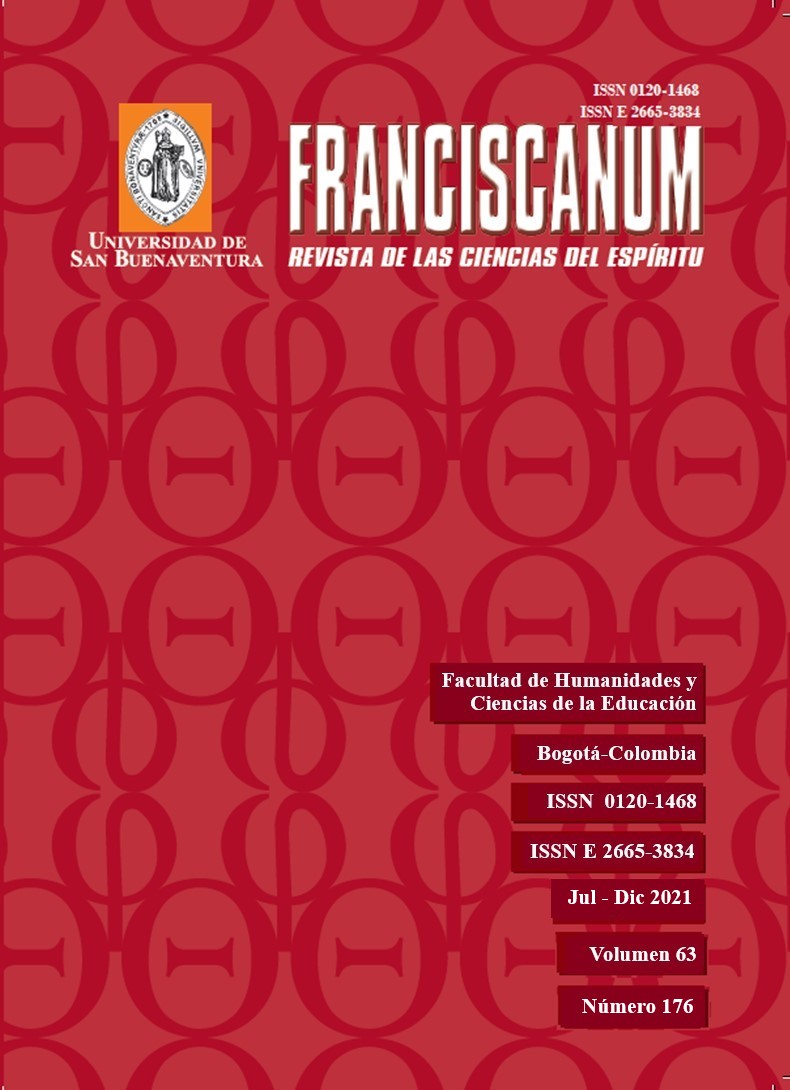This journal provides immediate open access to its content, based on the principle that giving the public free access to research helps a greater global exchange of knowledge.
Therefore, the Creative Commons 4.0 Attribution Attribution - Equal Share (by-sa) License is accepted: The commercial use of the work and the possible derived works is permitted, the distribution of which must be done with a license equal to that regulates the original work.
http://creativecommons.org/licenses/by-sa/4.0/
Along these same lines and in line with the Open Access policy, it is clarified that the authors maintain their rights to articles, without restrictions and, in the same way, they maintain their publication rights, without restrictions. They are only asked to reference the number of the Franciscanum magazine where the article initially appeared.
Abstract
After a brief introduction, the segmented translation of the Hebrew text is presented, with some remarks of the textual criticism. The segmentation has made easier the perception and the understanding of the text organization: a symmetrical structure. The study proceeds with the rhetorical analysis, pointing elements of both of Semitic and Greco-Latin logic. In this perspective, it is understandable the critical speech of Moses. By the nature of the book of Deuteronomy’s narrative, as by the possession of the torah book, the people will experience two outcomes: the death of its great leader and the entry into the land of Canaan, under the guidance of a successor: Joshua.
References
Aristóteles. Retorica e Poetica. A cura di Marcelo Zanata. Torino: Unione Tipografico-Editrice Torinese, 2004.
Amsler, Samuel. «Loi rale et loi écrite dans le Deutèronome». En Das Deuteronomium – Entstejung, Gestal und Botschaft. Editado por Norbert Lohfink, 51-54. Leuven: Leuven University Press, 1995.
Arnold, Bill T. «Deuteronomy as the Ipsissima Vox of Moses». Journal of Theological Interpretation 1, Vol. 4 (2010): 56-61.
Aurelius, Erik. «Heilsgegenwart im Wort: Dtn 30,11-14». En Liebe un Gebot. Studien zum Deuteronomium. Editado por Perlitt, L. – Kratz, R. G. – Spieckermann, H., 13-29. Göttingen: Vandenhoeck & Ruprecht, 2000.
Cícero, Marco Tullioo. La invención retórica. Introdución, tradución y notas de Salvador Nuñez. Madrid: Editorial Gredos, 1997.
Corini, Gabriele. Dt 28,69–30,20: la nuova alleanza in Moab. Israele tra memoria e identità. Milano: Glossa, 2010.
Coxhead, Steven R. «Deuteronomy 30:11-14 as a prophecy of the new covenant in Christ». Westminster Theological Journal 2 Vol. 68 (2006): 305-311.
Craigie, Peter C. The Book of Deuteronomy. Grand Rapids: William B. Eerdmans Publishing Company, 1976.
de Pury, Albert. Org. O Pentateuco em Questão. As origens e a composição dos cinco primeiros livros da Bíblia à luz das pesquisas recentes. Petrópolis/RJ: Vozes, 2002.
Dogniez, Cécile et Harl, Marguerite. La Bible d’Alexandrie – Le Deutéronome. Paris: Les Éditions du Cerf, 1992.
Dozeman, Thomas; Römer, Thomas; Schmid, Konrad. Pentateuch, Hexateuch, or Enneateuch: identifying literary works in Genesis through Kings. Atlanta: Society of Biblical Literature, 2011.
Fernandes, Leonardo Agostini. «A atualidade do “hoje” em Dt 26,16-19». Pistis & Praxis 2, Vol. 11 (2019): 378-398.
Follingstad, Carl Martin. Deicti Viewpoint in Biblical Hebrew Text: A Syntagmatic and Paradigmatic Analysis of the Particle כי. Dallas: SIL, 2001.
García López, Félix. «Deut 34, Dtr History and the Pentateuc». En Studies in Deuteronomy in honour of C. J. Labuschagne on the occasion of his 65th birthday. Editado por F. García Martínez; A. Hilhorst; J. T. A. G. M. Van Ruiten; A. S. Van Der Woude, 47-61. Leiden: E. J. Brill, 1994.
García López, Félix. Il Pentateuco. Introduzione alla lettura dei primi cinque libri della Bibbia. Brescia: Paideia, 2004.
García Martínez, Félix. «Les manuscrits du Désert de Juda et le Deutéronome». En Studies in Deuteronomy in honour of C. J. Labuschagne on the occasion of his 65th birthday. Editado por F. García Martínez; A. Hilhorst; J. T. A. G. M. Van Ruiten; A. S. Van Der Woude, 63-82. Leiden: E. J. Brill, 1994.
Greenspahn, Frederick E. «A Mesopotamian Proverb and Its Biblical Reverberations». Journal of American Oriental Society 1, Vol. 114 (1994): 33-38.
Haraguchi, Takaaki. «A Rhetorical Analysis of Deuteronomy 29–30». Asia Journal of Theology 1, Vol. 15 (2001): 24-37.
Joüon, Paul y Muraoka, Takamitsu. A Grammar of Biblica Hebrew. Roma: PIB, 2006.
Knudtzon, J. A. Die El-Amarna Tafeln. Leipzig: Hinrichs, 1915.
Krašovec, Jože. Der Merismus im Biblisch-Hebräischen un Nordwestsemitischen. Roma: PIB, 1977.
Leibowitz, Nehama. Studies in Devarim – Deuteronomy. Jerusalem: Alva Press, 1980.
Lenchak, Timothy A. «Choose Life!». A Rhetorical-Critical Investigation of Deuteronomy 28,69–30,20. Roma: PIB, 1993.
McCarthy, Carmel. Deuteronomy – Biblia Hebraica quinta editione cum apparatu critico novis curis elaborato. Stuttgart: Deutsche Bibelgesellschaft, 2007.
Meynet, Roland; Oniszczuk, Jacek (a cura di). Retorica Biblica e Semitica 1 (Atti del primo convegno RBS). Bologna: EDB, 2009;
Meynet, Roland; Oniszczuk, Jacek (a cura di). Retorica Biblica e Semitica 2 (Atti del secondo convegno RBS). Bologna: EDB, 2011.
Meynet, Roland. Studi di Retorica Biblica. Torino: Claudiana, 2008.
Miller, Patrick D. Deuteronomio. Torino: Claudiana, 2008.
Moran, William L. «The Ancient Near Easter Background of the Love of God in Deuteronomy». Catholical Biblical Quarterly 1, Vol. 25 (1963): 77-87.
Paganini, Simone. Deuteronomio. Milano: Paoline, 2011.
Papola, Grazia. Deuteronomio – introduzione, traduzione e commento. Milano: San Paolo, 2011.
Papola, Grazia. L’Alleanza di Moab Studio exegético teológico di Dt 28,69–30,20. Roma: PIB, 2008.
Quintiliano, Marco Fabio. L’Istituzione Oratoria. Volume primo e secondo a cura di Rino Faranda e Piero Pecchiura. Torino: Unione Tipografico-Editrice Torinese, 2003.
Römer, Thomas. The So-Called Deuteronomistic History. A sociological, historical and literary introduction. New York: T&T Clark, 2007.
Ska, Jean-Louis. «Il decalogo o la legge negoziata». Esodo (Diritti e libertà nella solidarietà) Vol. 3 (2019): 47-52.
Sonnet, Jean-Pierre. «La construction narrative de la figure de Moïse comme profete dans le Deutéronome». Revue de Théologie et de Philosophie Vol. 142 (2010): 1-20.
Vega Reñón, Luis y Olmos Gómez, Paula. Compendio de Lógica, Argumentación y Retórica. Madrid: Editorial Trotta, 2011.
Vicent, Rafael. «Derash Homiletico em Romanos 9–11». Salesianum Vol. 42 (1980): 751-788.
Watson, Duane F. and Hauser, Alan J. Rhetorical Criticism of the Bible. A Comprehensive Bibliography with Notes on History and Method. Leiden-New York-Köln: E. J. Brill, 1994.

 Perfil Google Scholar
Perfil Google Scholar


















